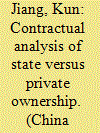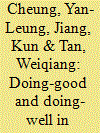|
|
|
Sort Order |
|
|
|
Items / Page
|
|
|
|
|
|
|
| Srl | Item |
| 1 |
ID:
159038


|
|
|
|
|
| Summary/Abstract |
We uniquely analyze the advantages and disadvantages of private ownership versus state ownership under various circumstances by focusing on three aspects: external risk, internal governance, and relative importance of owners versus managers. Our theoretical analysis indicates that private ownership is better than state ownership if the business environment is risky, corruption is limited, or the manager plays a more important role than the owner. Our empirical analysis supports our theoretical findings and reveals that better internal governance, more external risk and greater importance of the manager will magnify the benefits of privatization.
|
|
|
|
|
|
|
|
|
|
|
|
|
|
|
|
| 2 |
ID:
116503


|
|
|
|
|
| Publication |
2012.
|
| Summary/Abstract |
Recently, the presumed benefits of corporate social responsibility have become an important issue, especially for China where institutional settings are quite different from other parts of the world. Using an internationally accepted benchmark (OECD's Principles of Corporate Governance, OECD, 2004), this study constructs a corporate social responsibility (CSR) index to measure the quality of the corporate social responsibility practices of the 100 major Chinese listed firms during 2004-2007. This enables us to evaluate the progress of the corporate social responsibility practices of Chinese firms. The results show that Chinese companies have been making progress in their corporate social responsibility practices. The findings also show that market rewards Chinese firms for improving their corporate governance practices which implies 'doing-good' leads to 'doing-well' in the equity market in China. We also find that overseas-listed and more profitable Chinese firms have better improvement in CSR practice. This study has policy implications in pushing for further CSR initiatives in other emerging markets.
|
|
|
|
|
|
|
|
|
|
|
|
|
|
|
|
| 3 |
ID:
187840


|
|
|
|
|
| Summary/Abstract |
This paper shows the optimality of a two-tier linear salary scheme in internal labor markets and identifies conditions under which discretionary promotion is better than rule-based promotion and vice versa. Our main findings are: (1) regardless of whether discretionary promotion or rule-based promotion is used, a two-tier salary scheme is optimal; (2) the salary is contingent on promotion, which is fixed before and linear after promotion; (3) if the difference in human capital among agents is small, discretionary promotion is superior; (4) if the expected replacement cost of human capital is high, discretionary promotion is superior; (5) if the risk of facing/incurring a high replacement cost of human capital is high, discretionary promotion is superior; (6) if the chance of having a high human capital agent is high, rule-based promotion is likely to be superior; and (7) if the productivity improvement from a job promotion is large, rule-based promotion is likely to be superior. We have also found empirical evidence in support of our theory on the two-tier salary scheme.
|
|
|
|
|
|
|
|
|
|
|
|
|
|
|
|
| 4 |
ID:
116526


|
|
|
|
|
| Publication |
2012.
|
| Summary/Abstract |
Most privatizations around the world take the form of staged privatization with multistage lockups and step-by-step unlocking of shares. A lockup prevents the shares of a company from being sold to the public for a specified or unspecified period of time. This paper presents a theory and provides empirical evidence for staged privatization under market forces. The theory is based on a specification of a lockup effect on demand, where the existence of this lockup effect is shown by our empirical analysis. With this theory, we can analyze how various factors, such as the lockup effect, demand elasticity, growth potential and business fluctuations, affect staged privatization, in particular, the equilibrium speed of privatization. Our paper is the first to analyze a market-oriented, multistage privatization process, instead of a fully government-controlled or centrally planned process. Interestingly, staged privatization resembles initial public offerings (IPOs). Hence, our study can shed light on IPOs from a unique angle. Our empirical analysis provides evidence in support of our theoretical findings.
|
|
|
|
|
|
|
|
|
|
|
|
|
|
|
|
|
|
|
|
|